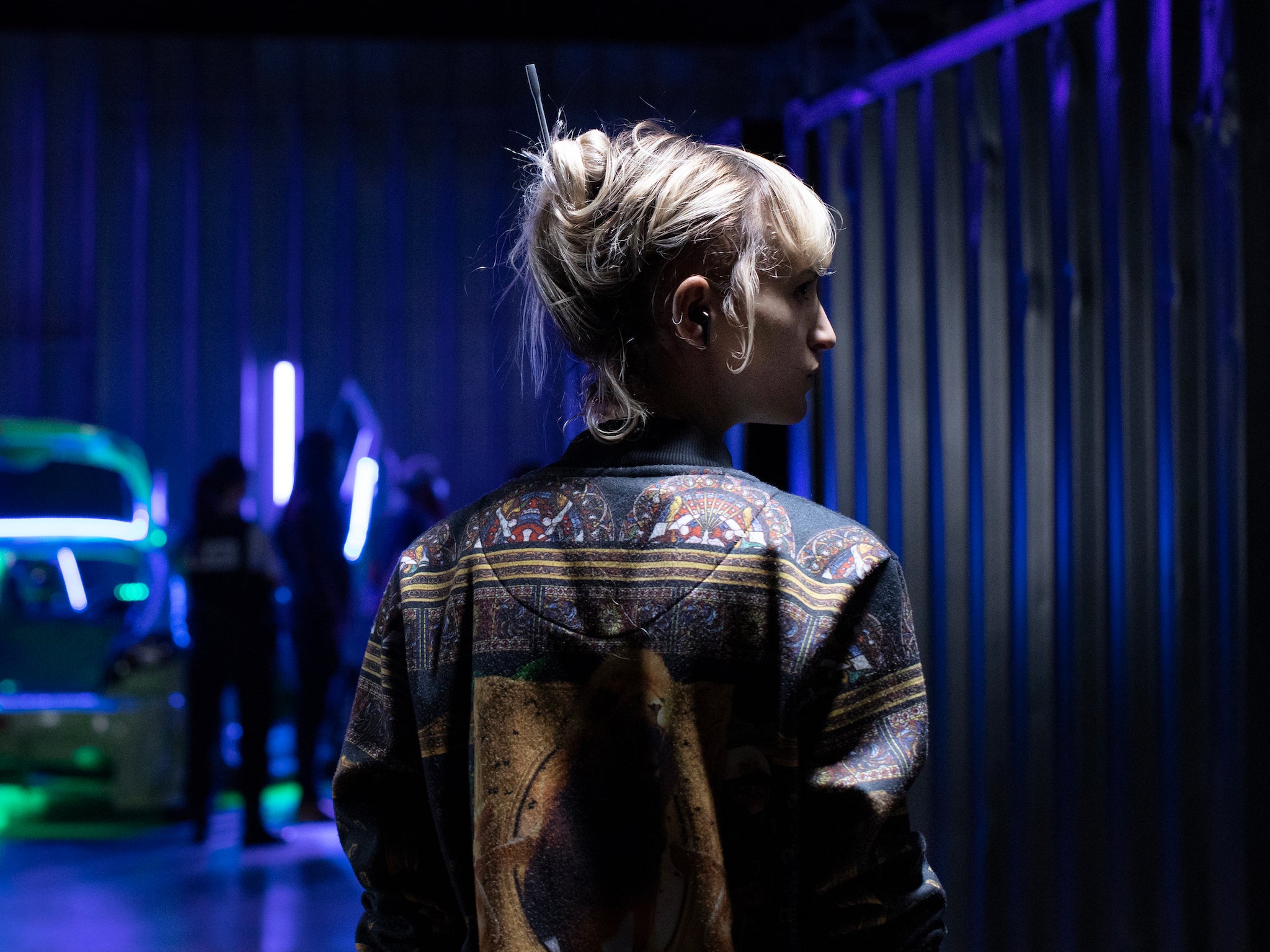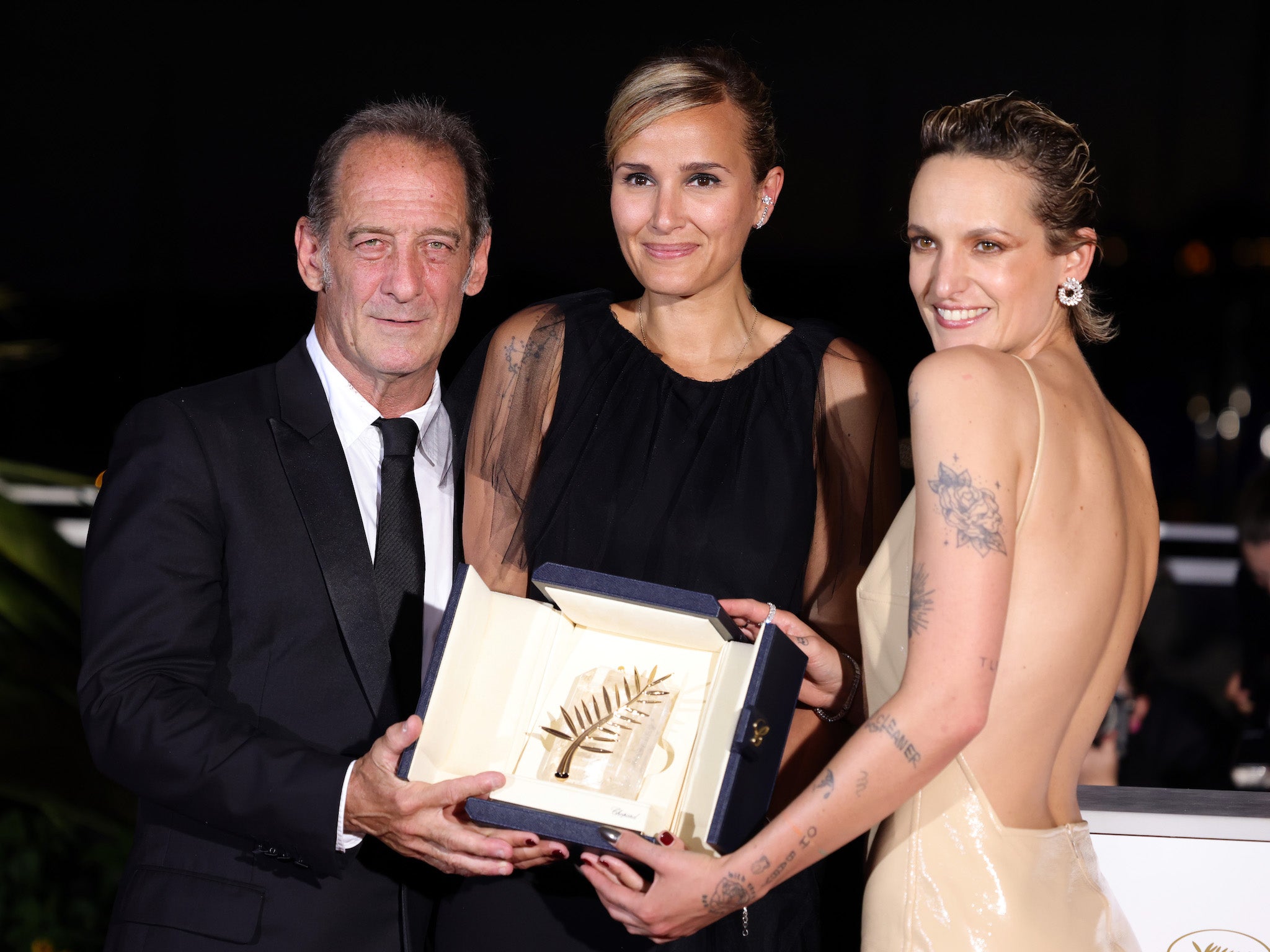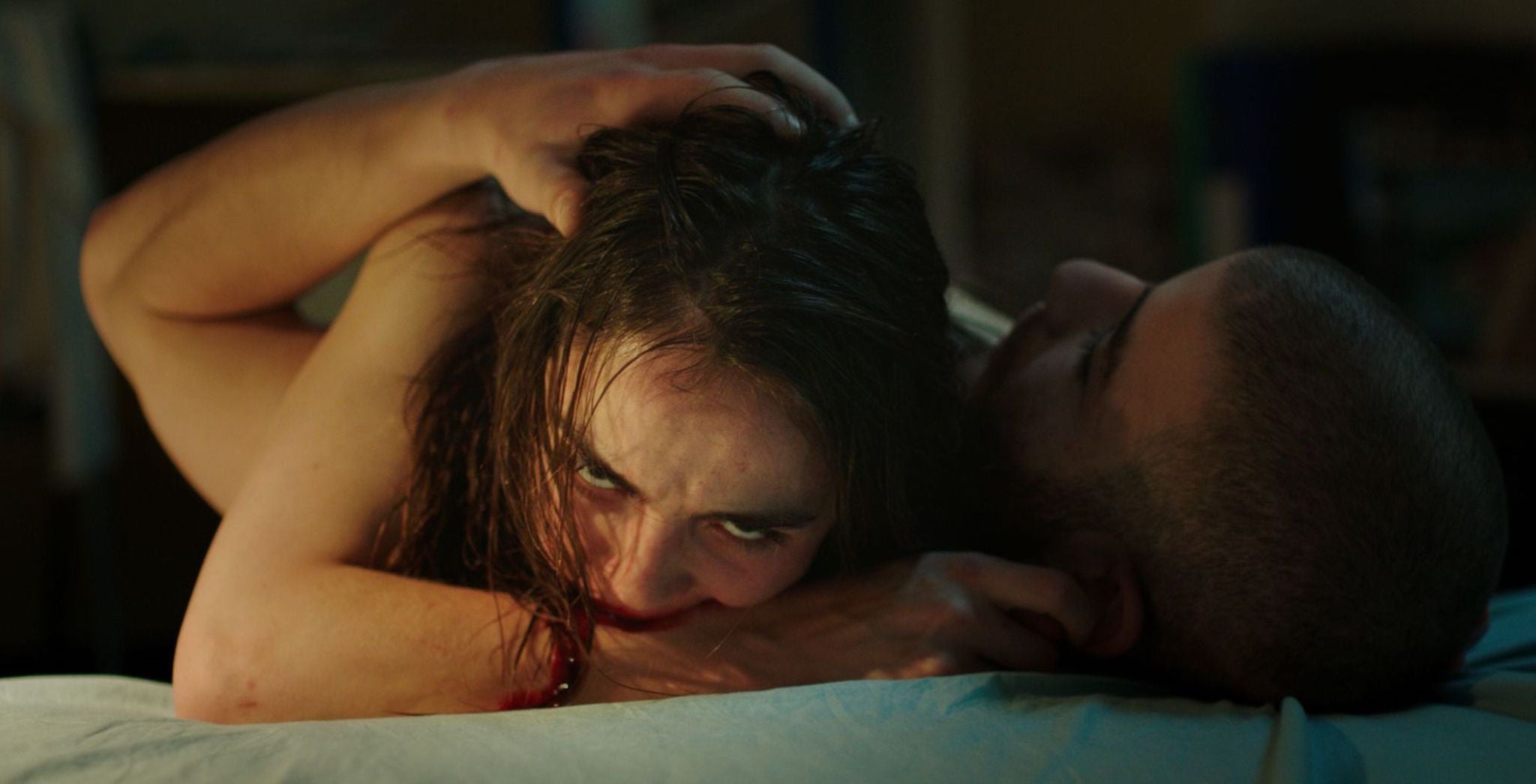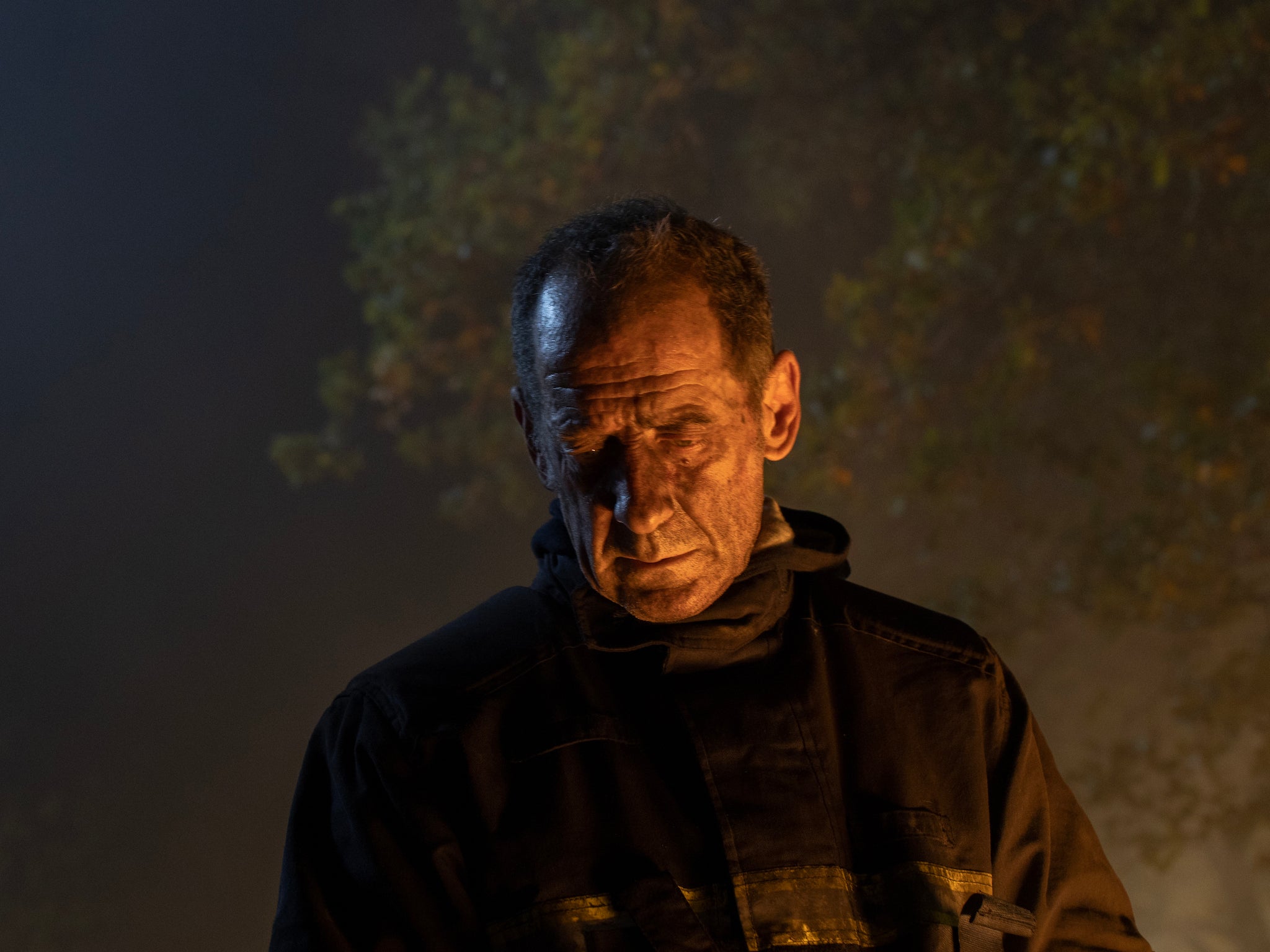‘People remember the shock value’: Titane director Julia Ducournau on making film where a woman f***s a car
The French auteur whose debut reportedly had audiences fainting tells Annabel Nugent why her Palme d’Or winner about a killer who’s carnally attracted to cars is about love and what it means to be human


The movie where the woman f***s the car. That’s how some people have described Titane, Julia Ducournau’s second feature, which was awarded the top prize in Cannes this year. Bear in mind, most of those people have never seen Titane. The moment in question – which does indeed see Ducournau’s protagonist writhe around nude inside a souped-up Cadillac while the automobile bounces vigorously of its own accord in mutual ecstasy – plays out in the film’s first 15 minutes. There’s still 95 minutes to go. And pretty much as soon as the next scene starts to roll, the car sex becomes just one of many indelible moments.
“I think that shock value is something people remember more easily,” says Ducournau in a heavy French accent over Zoom. The 38-year-old filmmaker is speaking from a dark, nondescript room. Her face is illuminated, eerily so, by the white light of the screen in front of her. She’s wearing a plain black Prada shirt, the brand’s small triangular logo emblazoned on her chest. In her hand is a lit cigarette surrounded by a garland of chunky silver rings. In conversation, she wears a bemused nonchalance that suggests very few things in this world have the ability to shock her. With Ducournau, there is no eagerness to please – or pacify.
Titane tells the story of Alexia (newcomer Agathe Rousselle), a killer on the run who is carnally attracted to cars. That really is scratching the chrome surface but, to be truthful, no logline could do this film justice. Titane was born into headlines. Its release was accompanied by reports of people leaving the cinema in disgust and/or indignation. There were, apparently, viewers fainting and vomiting (for what it’s worth, Ducournau says she’s witnessed neither herself). Titane was deemed the “Most Gross Movie” ever. It was the “Most Shocking Movie” ever. It was the “Weirdest Movie Ever”. The fullness of Titane was in danger of being flattened by three-word superlatives.
Ducournau wasn’t worried about that, though. “I expected it a little. But I can’t dictate what people want to remember of my film or what they want to see in it,” she says. “The way you make it yours is something I can’t do anything about.” Although she sounds less welcoming of these other interpretations than she does resigned to their inevitable existence.
Anyway, the filmmaker is used to headlines by now. “To be perfectly honest, they’ve been going on since Raw,” she says, taking a drag on her cigarette and rolling her eyes. Raw was her debut feature, released in 2016. It’s a tender bildungsroman about a veterinary student who develops a hunger for human flesh after ingesting raw rabbit kidney as part of a hazing ritual. Cinemas handed out barf-bags as a marketing ploy.
Again, people supposedly passed out during the film screening in Toronto – but if they did, they certainly woke up quickly enough to watch the rest and make it a hit. The film won the Fipresci Prize at Cannes in 2016, ensuring all eyes were on Ducournau and her next move. If there were any doubts, Titane makes Raw look like an amuse-bouche.
There are, as Ducournau put it, plenty of ways to make Titane yours. Pull on one narrative thread and you find more. The film unfurls like a clown’s handkerchief, only soaked in an amalgam of congealed blood and motor oil. It’s difficult to talk about Titane without spoiling the hair-raising experience of seeing it. But, here goes: We first meet Alexia as a child who is badly injured in a car accident. In surgery, a metal plate (titane is French for titanium) is fixed to her skull. The doctor advises her parents to “watch out” for any neurological side-effects.
Emerging from the hospital with her new scars, the child – who previously demonstrated an affinity with motor vehicles – still lovingly caresses her parent’s car. Flash forward and Alexia is all grown up (Rousselle). She’s an exotic dancer, and a mini-celebrity at the car shows where she performs.
As well as a car lover (I mean that literally; Alexia is said woman who f***s a car), she also happens to be a murderer who kills her victims using a trusty hairpin. After discovering she is pregnant with the car’s baby – Ducournau shows Alexia lactating black oil so there’s no mistaking whose child it is – she goes on a killing spree. It’s one murder too many and she’s forced to go on the lam. In a moment of desperation she radically and painfully alters her appearance to pass as a teenage boy named Adrien, who went missing a decade earlier.

Watch Apple TV+ free for 7 day
New subscribers only. £9.99/mo. after free trial. Plan auto-renews until cancelled.
ADVERTISEMENT. If you sign up to this service we will earn commission. This revenue helps to fund journalism across The Independent.

Watch Apple TV+ free for 7 day
New subscribers only. £9.99/mo. after free trial. Plan auto-renews until cancelled.
ADVERTISEMENT. If you sign up to this service we will earn commission. This revenue helps to fund journalism across The Independent.
In disguise, she is brought by the police to Adrien’s father, Vincent (a formidable and devastating Vincent Lindon) who brings Alexia/Adrien home to the fire station where he is the captain of a group of young men in training. What ensues is an unpredictable thriller set to the fretful pace of an impending birth. But mostly, it is a found-family story in which two lonely people, Alexia, who has never been in love before, and Vincent, who believes he can never love again, find love within each other. An unconditional, absolute kind of love.
Titane is also a deeply queer story. The film treats gender, sexuality and love as flexible and constantly shifting. A moth flitting rather than one pinned forever under glass. With its emphasis on destabilising gender, the film has been read by some viewers as a trans drama. Ducournau insists, however, that it’s not. “It would not have occurred to me to take on such an important topic that I haven’t experienced myself,” she says matter-of-factly.
For Ducournau, this queerness is quotidian. “It’s natural to me,” she says. “I’m someone who sees life in a state of constant metamorphosis. I really do believe you’ve got to be many in order to be one. And maybe we’ll never be one. But that’s not the important thing.” The important thing, she clarifies, is to “go through these skins”. Her films themselves are structured like this. Layers moulting in order to bring her characters and us closer to the film’s core, which in Titane is that of transcendental love.

For her sullen and ferocious protagonist, Ducournau needed someone unknown. A blank canvas. “I wanted someone who would not bring a history of other films with them,” she says. “Someone who was completely a virgin of cinema in order for us to be really immersed in her transformation as it takes place and not predict anything beyond the character.” Alexia also needed to look androgynous. “The gender of the person was irrelevant.”
Ducournau and her casting director combed through Instagram and found Rousselle, a 33-year-old model with no film credits but a striking face that could transform in different light, at different angles. “She can become a different person. The fluidity of her look is something that appealed to me very much,” says the director.
Ducournau asked Rousselle to come back five or six times before giving her the part. Over the next year, the two of them embarked on a crash-course: Acting 101. Rousselle learnt monologues from Twin Peaks, Killing Eve and Network. She learnt to fight and dance in the dojo. “It was really a lot of work,” Ducournau sighs.
The director asks a lot from her actors. She also told Lindon – one of France’s most distinguished leads (and also a man in his sixties) – that he would have to commit to two years of weight training for his role as a kind-hearted, steroid-addicted firefighter. What they, and we as an audience, receive in return is a film like Titane, in which no punches are pulled.

Ducournau sees her films as part of a “continuous gesture”. To her, she says, they’re the same film at different stages. “I keep digging and digging and digging into these obsessions that I have, the same desires and the same quest that I have to explore humanity and what it means to be human. It’s a continuity.”
It’s natural, then, that the same names and actors appear across her oeuvre in multiple iterations. Raw’s protagonist Justine – played by Garance Marillier, whom Ducournau has said is “like a little sister and my muse” – stars in Titane too. Look back further and you’ll find Marillier’s Titane character was born in Ducournau’s 2011 debut short Junior. Justine is an adolescent whose skin begins to shed like a snake. The names Alexia and Adrien also recur in Ducournau’s work, though played by different actors.
“Obviously the context is different and the stakes are different, but they are all versions, mutations of the same person.” She breaks it down more simply: “If you had the multiverse, each film is a different universe that the character exists in.” Like an art house Marvel Cinematic Universe, though I don’t dare compare the two to Ducournau.
Ducournau hates when Titane is reduced solely to body horror. Titane is a monster, a multi-fanged, many-limbed beast that does not so much crawl across genres as it does obliterate any in its path. The film swallows expectations whole. But it also has a tender, fleshy belly which it chooses to reveal at unexpected moments: within a euphoric whirl on the dance floor. Or a helpful hand like the one Alexis extends Vincent when he is straining to inject steroids into his own arse.
I always try to bring these moments back to our form of reality even though my film is not at all realistic
But it’s easy to see where these simplifications come from: the film’s many moments of pure, squeal-inducing horror centred around the body. There is the time that Ducournau shows a nipple piercing being pulled by teeth, at first amorously then viciously like a dog with a steak. Or when Alexia attempts to give herself an abortion using the same hairpin she plunged into a man’s brain the night before. There are, of course, the numerous moments Alexia winces in pain as she binds her growing stomach and breasts. One particular scene I won’t detail but you’ll know it when you see it. This is gruesome, bloody violence, for sure, but it’s not gruesome, bloody violence for gruesome, bloody violence’s sake. The point isn’t to make you recoil. It’s to make you lean in.
“I always try to bring these moments back to our form of reality even though my film is not at all realistic,” says Ducournau, smacking her lips and lighting another cigarette. “It has to be referential to us. We have to recognise ourselves to identify with these bodies.”
Together with her special effects supervisor Olivier Afonso, with whom Ducournau has worked since he concocted the prosthetic sheets of skin for Junior, they made it believable: the pulling, scratching, stabbing, tearing, leaking. “I’m trying to erase the distance between you and my characters. I’m trying to erase the distance caused by the screen, that is caused by my film being fiction. Otherwise you’re not compelled to feel what they feel,” she says. “It has to be close to us. The more extravagant, the more organic it has to be in order to not have this distance that we have in the sci-fi genre in general.” That gap between what you’re seeing on screen and what you’re feeling (a phantom tug of the flesh, or sickening turn of the stomach) closes.

She mostly uses medical references for such scenes. On this subject, the filmmaker is willing to gift just one small detail of her personal life. Ducournau’s parents were doctors; her father was a dermatologist and her mother was a gynaecologist. On any formative memories or anecdotes, though, she won’t be pressed. “The only thing I can tell you is that my parents always told me there is one case per patient, meaning you can’t treat two people the same. It’s impossible because no one reacts the same way,” she says. “Beyond the medical realm, I think that is quite humane to say that and it’s something that I try to apply in my life and in my work and in my characters.”
Before the age of 10, Ducournau had read everything Edgar Allan Poe ever wrote. But she wasn’t some gothic kid, crying in a dark room and wearing all black. “You have to put things in context,” she says. “I was attracted to many things that can seem dark but I also watched so many comedies – I think I watched all of them – and I loved comic books.” She laughs before taking another drag. But Ducournau is uninterested in talking about herself. Who she is is unimportant; everything you need to know about her is on the screen. So then, back to the art.
At Cannes, when Spike Lee prematurely announced Titane as the winner by accident – another headline to add to the grab bag – history was made. Ducournau became the second woman director to win the Palme D’Or ever, the first being Jane Campion, who shared the award in 1993 for The Piano. “It was bigger than me at that moment,” recalls Ducournau, who later told Campion that she felt “linked to her in a very mystical way”. Campion had laughed in response.
“I also thought a lot about the woman that was going to be on this stage with this prize in her hands after me.” And we won’t be waiting another 28 years for that to happen, Ducournau assures me. “It can’t be like it used to. It’s impossible.”
Join our commenting forum
Join thought-provoking conversations, follow other Independent readers and see their replies
Comments


Bookmark popover
Removed from bookmarks